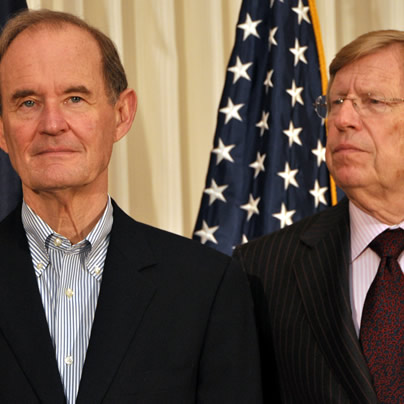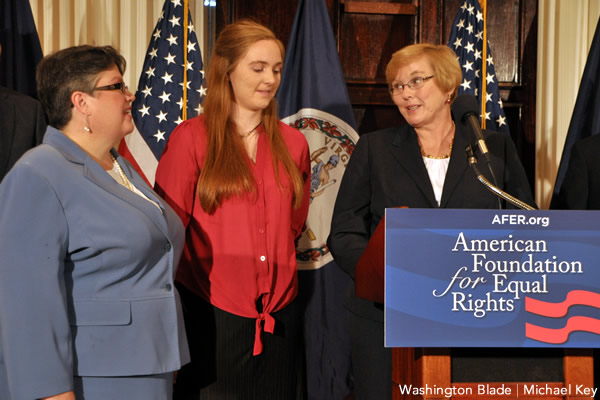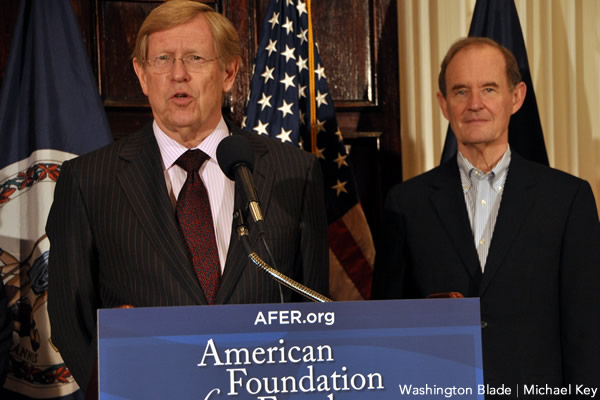Local
Olson, Boies join Virginia marriage lawsuit
Lawyers argued against Proposition 8 before the U.S. Supreme Court

The American Federation of Equal Rights on Sunday announced the lawyers who argued against California’s Proposition 8 before the U.S. Supreme Court will join a federal lawsuit that seeks to overturns Virginia’s same-sex marriage ban.
The Washington Post first reported attorneys representing Timothy Bostic and Tony London of Norfolk and Carol Schall and Mary Townley of Richmond asked Ted Olson and David Boies to join the case. The plaintiffs joined one of their lawyers, Tom Shuttleworth, AFER Executive Director Adam Umhoefer and Human Rights Campaign President Chad Griffin at a press conference that took place at the National Press Club in downtown D.C. on Monday
“I’m a Virginian,” Olson said, referring to the fact that Thomas Jefferson and many of the country’s other founding fathers are from the commonwealth. “Of all places in the United States, Virginia should recognize the rights of equality. Men and women in that state have the same basic fundamental underlying freedoms that everyone in America has.”
“This case is about liberty,” Boies added. “It’s about the pursuit of happiness. It’s about the inalienable right of every individual to marry the person who they love.”

Carol Schall (left) with Mary Townley and their daughter Emily. (Washington Blade photo by Michael Key)
Bostic and London, who have been together for 24 years, in July filed a federal lawsuit that challenges Virginia’s gay nuptials ban after the Norfolk Circuit Court denied them a marriage license. Towning and Schall, who have been together for 30 years and married in California in 2008, joined the Norfolk couple’s case earlier this month when their lawyers filed an amended lawsuit.
“We aren’t asking for special privileges or treatment,” Towning said at the National Press Club press conference as she stood alongside Schall and their 15-year-old daughter Emily. “We just want to be the same as everyone else to be married.”
Bostic told reporters his family’s Virginia roots date back to before the Declaration of Independence.
“I also stand before you as an individual who has and continues to be discriminated against by my home state because of who I am and who I love,” he said.
Neighboring Maryland is among the 13 states and D.C. in which same-sex couples can legally marry.
Virginia voters in 2006 approved a state constitutional ban on same-sex marriage, but Olson and Boies’ decision to join this case comes as the issue of nuptials for gays and lesbians continues to gain traction across the country after the U.S. Supreme Court in June struck down Prop 8 and a portion of the Defense of Marriage Act.
The American Civil Liberties Union, Lambda Legal and the ACLU of Virginia last month filed a class action federal lawsuit against Virginia’s gay nuptials ban on behalf of two lesbian couples from Richmond and Staunton who had been denied marriage licenses. The ACLU in July formally challenged Pennsylvania’s statutory gay marriage ban on behalf of 10 same-sex couples and a lesbian widow.
New Jersey Gov. Chris Christie on Friday said he’d appeal a judge’s ruling that said the state must allow gays and lesbians to marry. An Illinois judge on the same day said two lawsuits that challenge the state’s same-sex marriage ban can proceed.
Gay couples in New Mexico and Ohio have also filed lawsuits seeking marriage rights.
Lambda Legal, the ACLU and the ACLU of Virginia on Monday filed a motion with the U.S. District Court for the Western District of Virginia in Harrisonburg that seeks an expedited judgment in their case that challenges the commonwealth’s same-sex marriage ban.
“Virginians denied the freedom to marry have no meaningful legislative path to gain the same protections for their families as other loving committed couples,” ACLU of Virginia Executive Director Claire Guthrie Gastañaga said. “That’s why we’ve had to ask the federal court to overturn Virginia’s sweeping bans on recognizing same-sex relationships. We shouldn’t have to go to federal court to get Virginia to do what’s right.”
Gay state Sen. Adam Ebbin (D-Alexandria) is among those who applauded Olson and Boies’ decision to join the case.
“It is not a question of whether marriage equality will come to Virginia; it is a question of when,” he said in a statement in which he also praised Lambda Legal, the ACLU and the ACLU of Virginia for challenging the commonwealth’s same-sex marriage ban. “This is the time for Virginia to wake up from history–as Jefferson said, ‘laws and institutions must go hand in hand with the progress of the human mind.'”
“This team brings years of experience advocating for the rights of gay and lesbian couples and will only help to ensure that all Virginians will soon be able to enjoy the freedom to marry,” James Parrish, executive director of Equality Virginia, added. “As we continue our work to change hearts and minds throughout the state, we will closely monitor both this lawsuit and the one filed by the ACLU and Lambda Legal.”
Tucker Martin, a spokesperson for Gov. Bob McDonnell, defended the gay nuptials prohibition.
“The voters of Virginia passed a constitutional amendment in 2006 defining marriage in the commonwealth as being only a union of one man and one woman,” Martin said. “It is the law in this state based on the popular will of the voters as expressed at the ballot box.”
Attorney General Ken Cuccinelli did not immediately return the Washington Blade’s request for comment. He did reaffirm his opposition to marriage rights for gays and lesbians as he squared off against former Democratic National Committee Chair Terry McAuliffe during the latest gubernatorial debate that took place in McLean on September 25.
“I understand and respect the fact that this is a sensitive issue to a lot of Virginians,” Cuccinelli said. “But I’m one of those who do believe that the institution of marriage should remain between one man and one woman.”
Both Olson and Umhoefer noted during the AFER press conference that the U.S. Supreme Court in 1967 struck down the commonwealth’s interracial marriage ban in its landmark Loving v. Virginia decision.
“We’re hoping that the case in Virginia is the beginning of the end,” Boies said, referring to the movement for marriage rights for same-sex couples after the U.S. Supreme Court found Prop 8 and the Defense of Marriage Act unconstitutional. “The citizens of Virginia, no less than the citizens of California are entitle to marry the person they love.”
Boies told the Blade he and Olson decided to join the case Bostic and London and Schall and Townley filed because it was the first one in the commonwealth to “establish marriage equality.” Greg Nevins of Lambda Legal said after the AFER press conference that Boies and Olson’s involvement in legal efforts to extend marriage rights to gays and lesbians in Virginia “can only be a good thing.”
“We’re happy to collaborate and work with anyone who shares this goal,” Nevins said.
Boies also told the Blade he would like to see President Obama intervene in the Virginia marriage case of which he and Olson are now a part as the Justice Department did in the Prop 8 lawsuit.
District of Columbia
D.C. police arrest man for burglary at gay bar Spark Social House
Suspect ID’d from images captured by Spark Social House security cameras

D.C. police on Feb. 18 arrested a 63-year-old man “of no fixed address” for allegedly stealing cash from the registers at the gay bar Spark Social House after unlawfully entering the bar at 2009 14th St., N.W., around 12:04 a.m. after it had closed for business, according to a police incident report.
“Later that day officers canvassing for the suspect located him nearby,” a separate police statement says. “63-year-old Tony Jones of no fixed address was arrested and charged with Burglary II,” the statement says.
The police incident report states that the bar’s owner, Nick Tsusaki, told police investigators that the bar’s security cameras captured the image of a man who has frequently visited the bar and was believed to be homeless.
“Once inside, the defendant was observed via the establishment’s security cameras opening the cash register, removing U.S. currency, and placing the currency into the left front pocket of his jacket,” the report says.
Tsusaki told the Washington Blade that he and Spark’s employees have allowed Jones to enter the bar many times since it opened last year to use the bathroom in a gesture of compassion knowing he was homeless. Tsusaki said he is not aware of Jones ever having purchased anything during his visits.
According to Tsusaki, Spark closed for business at around 10:30 p.m. on the night of the incident at which time an employee did not properly lock the front entrance door. He said no employees or customers were present when the security cameras show Jones entering Spark through the front door around 12:04 a.m.
Tsusaki said the security camera images show Jones had been inside Spark for about three hours on the night of the burglary and show him taking cash out of two cash registers. He took a total of $300, Tsusaki said.
When Tsusaki and Spark employees arrived at the bar later in the day and discovered the cash was missing from the registers they immediately called police, Tsusaki told the Blade. Knowing that Jones often hung out along the 2000 block of 14th Street where Spark is located, Tsusaki said he went outside to look for him and saw him across the street and pointed Jones out to police, who then placed him under arrest.
A police arrest affidavit filed in court states that at the time they arrested him police found the stolen cash inside the pocket of the jacket Jones was wearing. It says after taking him into police custody officers found a powdered substance in a Ziploc bag also in Jones’s possession that tested positive for cocaine, resulting in him being charged with cocaine possession in addition to the burglary charge.
D.C. Superior Court records show a judge ordered Jones held in preventive detention at a Feb. 19 presentment hearing. The judge then scheduled a preliminary hearing for the case on Feb. 20, the outcome of which couldn’t immediately be obtained.
District of Columbia
Judge rescinds order against activist in Capital Pride lawsuit
Darren Pasha accused of stalking organization staff, board members, volunteers

A D.C. Superior Court judge on Feb.18 agreed to rescind his earlier ruling declaring local gay activist Darren Pasha in default for failing to attend a virtual court hearing regarding an anti-stalking lawsuit brought against him by the Capital Pride Alliance, the group that organizes D.C.’s annual Pride events.
The Capital Pride lawsuit, initially filed on Oct. 27, 2025, accuses Pasha of engaging in a year-long “course of conduct” of “harassment, intimidation, threats, manipulation, and coercive behavior” targeting Capital Pride staff, board members, and volunteers.
In his own court filings without retaining an attorney, Pasha has strongly denied the stalking related allegations against him, saying “no credible or admissible evidence has been provided” to show he engaged in any wrongdoing.
Judge Robert D. Okum nevertheless on Feb. 6 approved a temporary stay-away order requiring Pasha to stay at least 100 feet away from Capital Pride’s staff, volunteers, and board members until the time of a follow-up court hearing scheduled for April 17. He reduced the stay-away distance from 200 yards as requested by Capital Pride.
In his two-page order issued on Feb. 18, Okun stated that Pasha explained that he was involved in a scooter accident in which he was injured and his phone was damaged, preventing him from joining the Feb. 6 court hearing.
“Therefore, the court finds there is a good cause for vacating the default,” Okun states in his order.
At the time he initially approved the default order at the Feb. 6 hearing that Pasha didn’t attend, Okun scheduled an April 17 ex parte proof hearing in which Capital Pride could have requested a ruling in its favor seeking a permanent anti-stalking order against Pasha.
In his Feb. 18 ruling rescinding the default order Okun changed the April 17 ex parte proof hearing to an initial scheduling conference hearing in which a decision on the outcome of the case is not likely to happen.
In addition, he agreed to consider Pasha’s call for a jury trial and gave Capital Pride 14 days to contest that request. The Capital Pride lawsuit initially called for a non-jury trial by judge.
One request by Pasha that Okum denied was a call for him to order Capital Pride to stop its staff or volunteers from posting information about the lawsuit on social media. Pasha has said the D.C.-based online blog called DC Homos, which Pasha claims is operated by someone associated with Capital Pride, has been posting articles portraying him in a negative light and subjecting him to highly negative publicity.
“The defendant has not set forth a sufficient basis for the court to restrict the plaintiff’s social media postings, and the court therefore will deny the defendant’s request in his social media praecipe,” Okun states in his order.
A praecipe is a formal written document requesting action by a court.
Pasha called the order a positive development in his favor. He said he plans to file another motion with more information about what he calls the unfair and defamatory reports about him related to the lawsuit by DC Homos, with a call for the judge to reverse his decision not to order Capital Pride to stop social media postings about the lawsuit.
Pasha points to a video interview on the LGBTQ Team Rayceen broadcast, a link to which he sent to the Washington Blade, in which DC Homos operator Jose Romero acknowledged his association with Capital Pride Alliance.
Capital Pride Executive Director Ryan Bos didn’t immediately respond to a message from the Blade asking whether Romero was a volunteer or employee with Capital Pride.
Pasha also said he believes the latest order has the effect of rescinding the temporary stay away order against him approved by Okun in his earlier ruling, even though Okun makes no mention of the stay away order in his latest ruling. Capital Pride attorney Nick Harrison told the Blade the stay away order “remains in full force and effect.”
Harrison said Capital Pride has no further comment on the lawsuit.
District of Columbia
Trans activists arrested outside HHS headquarters in D.C.
Protesters demonstrated directive against gender-affirming care

Authorities on Tuesday arrested 24 activists outside the U.S. Department of Health and Human Services headquarters in D.C.
The Gender Liberation Movement, a national organization that uses direct action, media engagement, and policy advocacy to defend bodily autonomy and self-determination, organized the protest in which more than 50 activists participated. Organizers said the action was a response to changes in federal policy mandated by Executive Order 14187, titled “Protecting Children from Chemical and Surgical Mutilation.”
The order directs federal agencies and programs to work toward “significantly limiting youth access to gender-affirming care nationwide,” according to KFF, a nonpartisan, nonprofit organization that provides independent, fact-based information on national health issues. The executive order also includes claims about gender-affirming care and transgender youth that critics have described as misinformation.
Members of ACT UP NY and ACT UP Pittsburgh also participated in the demonstration, which took place on the final day of the public comment period for proposed federal rules that would restrict access to gender-affirming care.
Demonstrators blocked the building’s main entrance, holding a banner reading “HANDS OFF OUR ‘MONES,” while chanting, “HHS—RFK—TRANS YOUTH ARE NO DEBATE” and “NO HATE—NO FEAR—TRANS YOUTH ARE WELCOME HERE.”
“We want trans youth and their loving families to know that we see them, we cherish them, and we won’t let these attacks go on without a fight,” said GLM co-founder Raquel Willis. “We also want all Americans to understand that Trump, RFK, and their HHS won’t stop at trying to block care for trans youth — they’re coming for trans adults, for those who need treatment from insulin to SSRIs, and all those already failed by a broken health insurance system.”
“It is shameful and intentional that this administration is pitting communities against one another by weaponizing Medicaid funding to strip care from trans youth. This has nothing to do with protecting health and everything to do with political distraction,” added GLM co-founder Eliel Cruz. “They are targeting young people to deflect from their failure to deliver for working families across the country. Instead of restricting care, we should be expanding it. Healthcare is a human right, and it must be accessible to every person — without cost or exception.”

Despite HHS’s efforts to restrict gender-affirming care for trans youth, major medical associations — including the American Medical Association, the American Academy of Pediatrics, and the Endocrine Society — continue to regard such care as evidence-based treatment. Gender-affirming care can include psychotherapy, social support, and, when clinically appropriate, puberty blockers and hormone therapy.
The protest comes amid broader shifts in access to care nationwide.
NYU Langone Health recently announced it will stop providing transition-related medical care to minors and will no longer accept new patients into its Transgender Youth Health Program following President Donald Trump’s January 2025 executive order targeting trans healthcare.
-

 National5 days ago
National5 days agoTrump falsely links trans people to terrorism
-

 Virginia5 days ago
Virginia5 days agoFellow lawmakers praise Adam Ebbin after Va. Senate farewell address
-

 National4 days ago
National4 days agoLGBTQ activists mourn the Rev. Jesse Jackson
-

 Massachusetts4 days ago
Massachusetts4 days agoEXCLUSIVE: Markey says transgender rights fight is ‘next frontier’




















